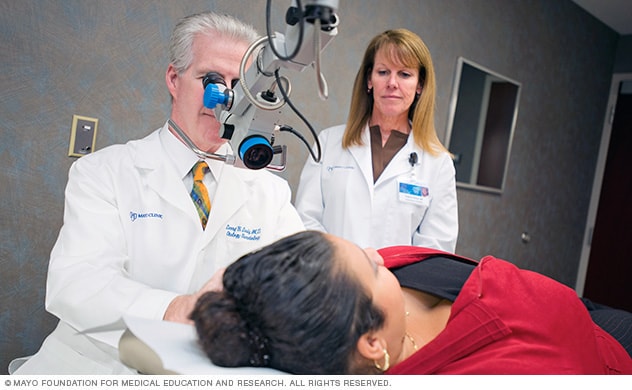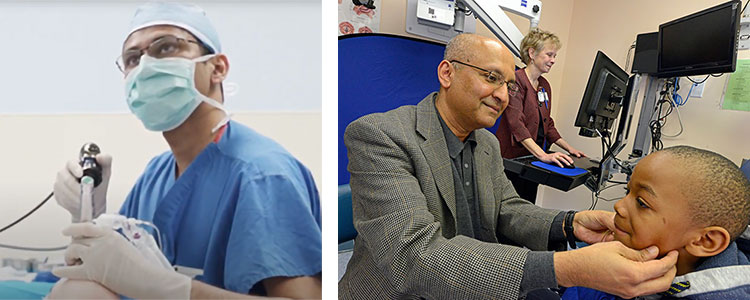How to Know It's Time to See a Voice Doctor
How to Know It's Time to See a Voice Doctor
Blog Article
Exploring the Area of Otolaryngology: What to Anticipate When You Consult an ENT
Otolaryngology, frequently described as ENT, encompasses the diagnosis and treatment of nose, throat, and ear conditions. For those experiencing related problems, seeking advice from an ENT professional can provide clarity and alleviation. Comprehending what to expect during such examinations is vital for effective communication and treatment. This review will detail essential elements of the ENT experience, including typical factors for brows through and the procedures associated with diagnosis and treatment.

Comprehending Otolaryngology: A Summary
Otolaryngology, usually referred to as ENT (Nose, ear, and throat) medication, is a specific branch of medication that concentrates on the medical diagnosis and treatment of problems influencing these crucial areas of the human body. This field incorporates a large range of disorders, including those pertaining to hearing, balance, breathing function, and speech. Otolaryngologists are educated to handle both medical and medical treatments, making use of innovative methods and technologies. Their expertise expands beyond conventional disorders, resolving concerns such as allergic reactions, sinus infections, and hearing loss. Additionally, they play an important duty in the monitoring of head and neck cancers, supplying detailed treatment customized to specific patient demands. In general, otolaryngology stays essential for keeping health and wellness and lifestyle in affected people.
Typical Factors to See an ENT Professional
Many people seek the expertise of an ENT specialist for a range of factors, reflecting the diverse nature of problems that influence the throat, ear, and nose. Usual concerns include chronic sinus problems, which commonly leads to persistent nasal congestion and facial pain. Allergies and their associated signs, such as sneezing and itching, additionally motivate visits to these specialists (Voice). Hearing loss, whether steady or abrupt, is one more considerable reason for consultation. Furthermore, individuals may look for evaluation for throat problems, including relentless hoarseness or ingesting difficulties. Rest apnea, characterized by interrupted breathing during rest, is frequently attended to by ENT specialists also. Each of these conditions highlights the relevance of specialized care in taking care of complex ENT-related wellness problems
Preparing for Your ENT Visit
When getting ready for an ENT consultation, it is necessary to collect pertinent information and consider any particular concerns. Patients must compile a comprehensive clinical history, consisting of previous ear, nose, or throat issues, surgical treatments, and present drugs. Documenting signs-- such as regularity, extent, and duration-- can offer important understandings for the ENT specialist. In addition, people ought to prepare a list of concerns they wish to ask, making sure that all worries are attended to during the check out. Bringing along any kind of appropriate medical documents or examination outcomes can additionally assist the ENT in comprehending the client's condition. People need to verify their visit information, including day, time, and location, to minimize any type of final complication. Proper prep work can improve the performance of the assessment and result in much better results.
What to Anticipate Throughout the Consultation
As the assessment begins, the person can expect to involve in a complete discussion with the ENT specialist concerning their signs and symptoms and case history. The expert will make inquiries about the duration, frequency, and seriousness of symptoms such as hearing loss, nasal blockage, or aching throat. In addition, the individual's previous clinical conditions, drugs, and any pertinent household background will be examined, helping the professional in developing a full understanding of the client's wellness. The ENT might likewise ask about way of life elements, such as exposure to irritants or irritants. This open discussion establishes a foundation for the assessment, ensuring that the person's concerns are resolved and setting the stage for any necessary examinations or recommendations for treatment.
Diagnostic Examinations and Procedures in Otolaryngology
A series of analysis tests and procedures are crucial in otolaryngology to properly assess and diagnose problems impacting the nose, ear, and throat. Common tests consist of audiometry, which measures hearing function, and tympanometry, examining middle ear pressure. Nasal endoscopy enables visualization of the nasal flows and sinuses, while laryngoscopy examines the throat and singing cords. Imaging strategies, such as CT scans and MRIs, provide thorough views of head and neck structures. Allergy testing might likewise be carried out to recognize triggers for sinus or breathing concerns. These diagnostic tools enable ENT professionals to establish a complete understanding of patients' conditions, ensuring tailored and effective monitoring strategies. Proper medical diagnosis is important for successful treatment end results in otolaryngology.
Therapy Alternatives Provided by ENT Specialists
ENT experts provide a range of therapy alternatives tailored to address particular problems influencing the throat, nose, and ear. These therapies vary from conservative methods, such as medication and way of living adjustments, to more intrusive treatments. Allergies might be managed with antihistamines or immunotherapy, while persistent sinus problems might require nasal corticosteroids or sinus surgery. For hearing loss, ENT professionals often suggest listening devices or medical interventions like cochlear implants. In instances of throat disorders, options can consist of speech treatment or operations to get rid of obstructions. Additionally, they might offer guidance for managing sleep apnea, including the use of CPAP gadgets or surgical treatments. Generally, the goal is to boost clients' high quality of life with customized treatment and effective treatment techniques.
When to Seek Follow-Up Care With an ENT
When to seek follow-up care with an ENT professional is essential for handling recurring signs and symptoms or problems connected to throat, ear, and nose conditions, identifying. Patients ought to consider setting up a follow-up appointment if symptoms persist despite initial therapy, such as chronic ear pain, nasal congestion, or throat discomfort. Adjustments in hearing, equilibrium problems, or unusual nasal discharge may additionally require further assessment. Furthermore, if a person experiences adverse effects from suggested medications or has gone through an operation, follow-up care is essential to monitor recuperation and resolve any type of worries. Prompt consultations can guarantee reliable monitoring of conditions, protect against possible problems, and provide satisfaction pertaining to one's check here health and wellness. Looking for follow-up care promotes positive wellness administration in otolaryngology.
Frequently Asked Concerns

What Qualifications Should I Try to find in an ENT Specialist?
When seeking an ENT specialist, one need to search for board certification, relevant experience, and solid client testimonials. Furthermore, effective interaction abilities and a thoughtful technique can significantly improve the total treatment experience.
How Do I Choose the Right ENT for My Requirements?
Picking the appropriate ENT professional includes evaluating their credentials, experience, and client reviews (ENT). It is vital to contemplate their communication style and technique to treatment, ensuring they line up with the person's particular health requirements and choices
Exist Any Type Of Threats Related To ENT Procedures?
The threats related to ENT treatments may include infection, blood loss, anesthetic problems, and potential damages to bordering structures. Clients should go over these threats with their doctor to comprehend individual problems and guarantee educated choices.
Exactly How Can I Take Care Of Anxiousness Before My ENT Appointment?
To handle stress and anxiety before an appointment, people can practice deep breathing workouts, visualize positive end results, prepare inquiries beforehand, and seek assistance from pals or family, fostering a feeling of reassurance and calmness.
What Should I Do if I Experience Adverse Effects From Treatment?
If adverse effects from therapy occur, the person must without delay report them to their healthcare service provider. Changes to therapy or added treatments might be essential to ensure safety and effectiveness in managing their problem - ENT Clinic. As the consultation begins, the individual can expect to involve in a complete conversation with the ENT professional concerning their signs and clinical history. These analysis devices enable ENT professionals to establish a comprehensive understanding of people' problems, making certain customized and reliable monitoring strategies. ENT professionals provide a selection of therapy choices tailored to deal with specific conditions affecting the nose, ear, and throat. When looking for an ENT expert, one should look for board accreditation, relevant experience, and solid person testimonials. Selecting the ideal ENT specialist entails assessing their qualifications, experience, and client reviews
Report this page